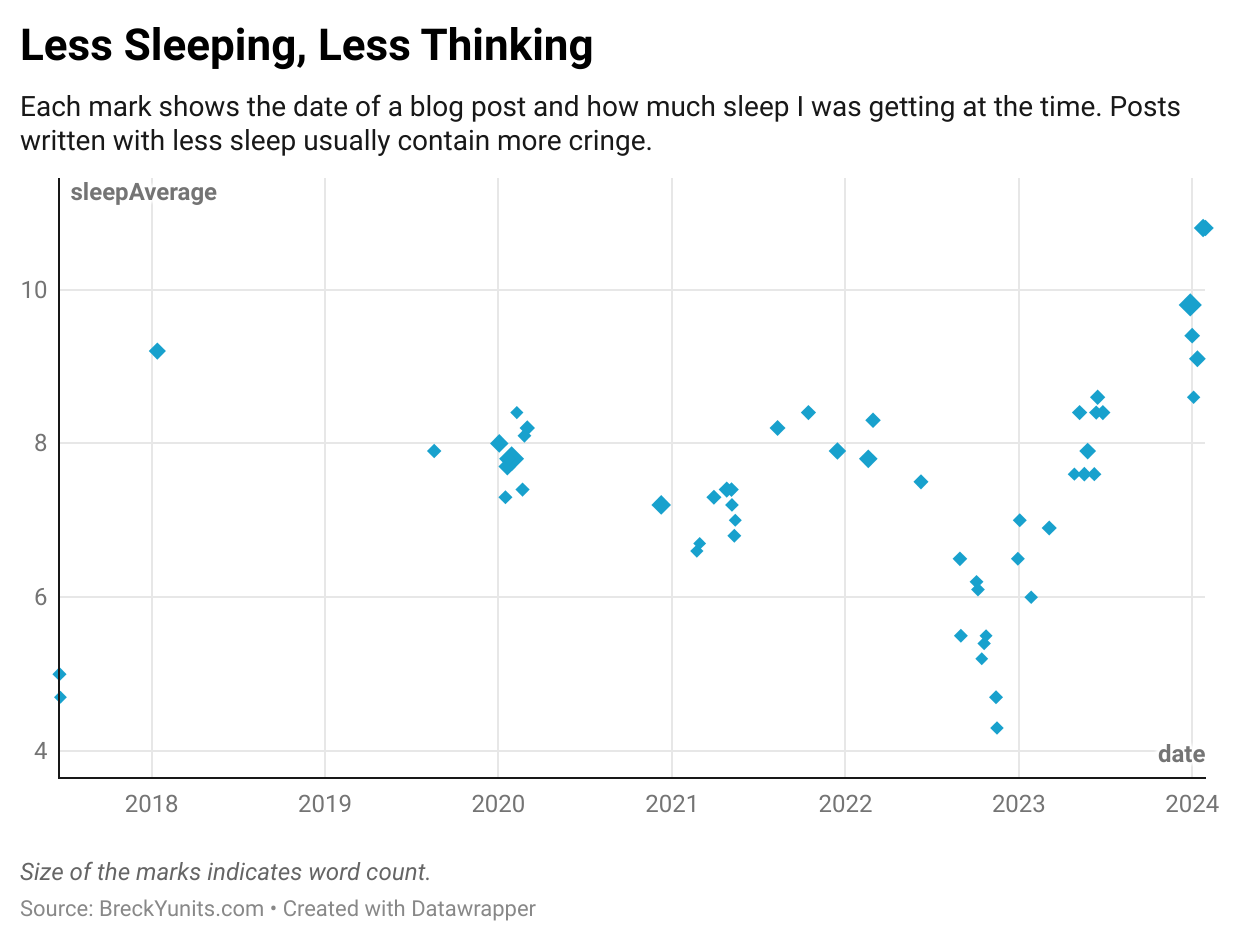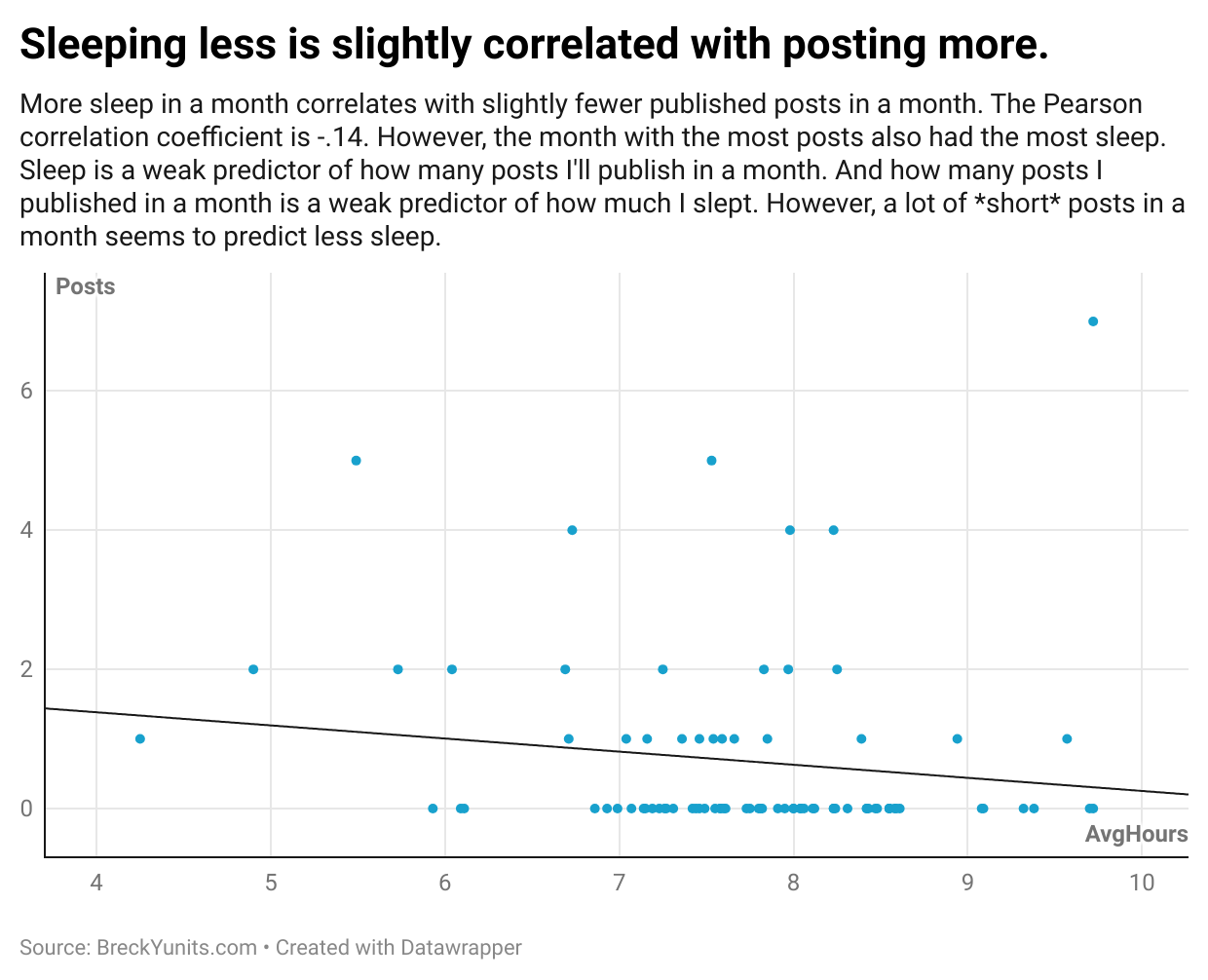April 5, 2024 — Have you ever examined the correlation between your writing behavior and sleep?
I've written some things in my life that make me cringe. I might cringe because I see some past writing was naive, mistaken, locked-in, overconfident, unkind, insensitive, aggressive, or grandiose.
I now have a pretty big dataset to identify my secret trick to write more cringe: less sleep.
For this post I combined 2,500 nights of sleep data with 58 blog posts. A 7 year experiment to see how sleep affects my writing.

~7 Hours is the Cutoff
Most posts above 7 hours of sleep do not need a sleep disclaimer. Most posts below 7 hours do. Not to say there is no value in the posts made with under 7 hours of sleep, it's just less rigorous writing (and thinking). On the plus side, writing with little sleep can be more concise at times. It might exaggerate the key ideas, but nevertheless identify them fearlessly and concisely.
Interactive Table
Static image of table above.

More Posts. Similar Word Counts. Higher Scatteredness. Similar IQ. Higher Confidence.
I actually post slightly more when I sleep less (Pearson correlation coefficient of -.14), but fewer words per post, which is indicative of a more "scattered" thinking state. I was surprised to see that I don't generally generate a whole lot more words in deprived sleep states. I perceive my writing to be smarter during those times, but looking back it's clearly not.
Other Social Media
Besides this blog, I have long written and posted content to HackerNews, Reddit, other discussion forums, and at times Twitter, Instagram, Facebook, YouTube, and LinkedIn. I haven't done the data grunt work, but if my memory serves me correctly I am confident my publishing behavior on those platforms mirrors the same patterns as my blogging behavior, with regards to sleep.
Public vs Private Writing
There have been stretches where I published little publicly but was generating a similar amount of tokens, just in private groups. My writing patterns in private groups also mirrors my patterns on this blog, with regards to sleep.
Tangent: when I've been lucky to be a part of brainiac private organizations (such as Microsoft, YCombinator, Our World in Data, academia, and so on), I got to read so much brilliant writing by people who rarely post publicly, and every time I think about that I am humbled. There is so much well written content on the public web, and to think it is only a fraction of the great content ever written, is humbling.
Sleep Disclaimers
I realize I already have an unofficial "sleep disclaimer" policy. I have de-indexed (but kept published) at least a couple of sleep-deprived posts, and added a disclaimer/correction to at least 2 others. Now with this dataset I am sure I will append a few more sleep disclaimers.
With sleep disclaimers, I can say, "hey, might be interesting ideas here, but don't train too heavily on this".
Grateful for Git
I am happy with my decision to use git for this blog so that I always keep an honest history, while still being free to down weight sleep deprived content and try and keep my more thought-out out ideas front and center.
Benefits of Peer Review
I don't have a column for it (yet), but it does seem my better posts often were the ones where I took the time to get friends and/or colleagues to review, IRL. Sleep deprived posts I would generally blast out without talking to anyone.
Peer review is a great filter, and a great forcing function to put more effort in.
On the other hand, because the importance of ideas varies by so many orders of magnitude (there are "black swan" ideas), you could make an argument that spending too much time in one area of ideas isn't the optimal strategy, and publishing things as you go, improving them later, is an approach with merit.
Writing data reflects the current phenomena in your brain
It seems when I sleep less, my brain is in more of a pleasure seeking state, has a bias to action ("don't think, just do"), and feels less pain than in a more rested state. Less sleep means less critical thinking. Less sleep seems to make me less willing to invest the time in rewiring my brain to correct mistaken thought habits.
Grateful for FitBit
I started wearing a Microsoft Band when it first came out in November 2014. Then a Band 2, then FitBit Charge, Ionic, Versa, and now Sense 2. I am grateful for all the people involved with creating these things. I think continued progress in the wearable sensor field is the best bet for improving human health.